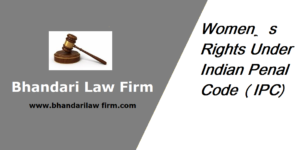How To Get Quashing of FIR In High Court Chandigarh
Quashing of FIR in high Court Chandigarh: Quashing of FIR is not easy task. In some of cases it can be done under section 482 of Code of Criminal Procedure by High Court. It is an inherent power given to High Court for safeguard of miscarriage of justice.
Inherent power cannot be utilized in each and every case. The High Court may quash the criminal complaint or FIR utilizes this power only when Criminal Complaint and FIR found to be false and frivolous and against the interest of justice.
The expert criminal lawyers of Bhandari Law Firm provide services of quashing of FIR high Court Chandigarh, Quashing of Criminal Complaint in Punjab and Haryana High Court and Supreme Court of India.
To Know More About Our Criminal Practice Click Here
In latest case THE SUPREME COURT OF INDIA by Exercising CRIMINAL APPELLATE JURISDICTION in CRIMINAL APPEAL NO.1723 OF 2017 [Arising out of SLP(CRL) No 9549 of 2016] titled as PARBATBHAI AAHIR @ PARBATBHAI BHIMSINHBHAI KARMUR AND ORS ..Appellants VERSUS STATE OF GUJARAT AND ANR. ..Respondents.
Supreme Court Issued Guidelines On Quashing Of FIR/Criminal Proceedings On The Ground Of Settlement Between Parties…
A three-Judge Bench of the Supreme Court has summarized the principles that need to be kept in mind by the High Courts while considering a plea for quashing an FIR/ Criminal Proceedings under Section 482 of the Code of Criminal Procedure on the ground of compromise between the parties.
The Bench comprising Chief Justice of India Dipak Misra, Justice A.M. Khanwilkar and Justice D.Y. Chandrachud passed the judgment on a Petition challenging an order passed by the Gujarat High Court, wherein the Appellants’ plea under Section 482 of Code of Criminal Procedure has been rejected….
The Appellants had sought quashing of FIR filed against them on the ground that they had amicably settled the dispute with the complainant. The complainant had also filed an affidavit to that effect.
The High Court had, however, noted that the case involves extortion, forgery and conspiracy and therefore, it was not in the interest of society at large to accept the settlement.
Hearing the Appeal, the Apex Court upheld the impugned order, after adverting to various precedents and summarizing the following broad principles:
- Section 482 preserves the inherent powers of the High Court to prevent an abuse of the process of any court or to secure the ends of justice. The provision does not confer new powers. It only recognizes and preserves powers which inhere in the High Court:
- The invocation of the jurisdiction of the High Court to quash a First Information Report or a criminal proceeding on the ground that a settlement has been arrived at between the offender and the victim is not the same as the invocation of jurisdiction for the purpose of compounding an offence. While compounding an offence, the power of the court is governed by the provisions of Section 320 of the Code of Criminal Procedure, 1973. The power to quash under Section 482 is attracted even if the offence is non-compoundable.
- In forming an opinion whether a criminal proceeding or complaint should be quashed in exercise of its jurisdiction under Section 482, the High Court must evaluate whether the ends of justice would justify the exercise of the inherent power.
- While the inherent power of the High Court has a wide ambit and plenitude it has to be exercised; (i) to secure the ends of justice or (ii) to prevent an abuse of the process of any court.
- The decision as to whether a complaint or First Information Report should be quashed on the ground that the offender and victim have settled the dispute, revolves ultimately on the facts and circumstances of each case and no exhaustive elaboration of principles can be formulated;
- In the exercise of the power under Section 482 and while dealing with a plea that the dispute has been settled, the High Court must have due regard to the nature and gravity of the offence. Heinous and serious offences involving mental depravity or offences such as murder, rape and dacoity cannot appropriately be quashed though the victim or the family of the victim have settled the dispute. Such offences are, truly speaking, not private in nature but have a serious impact upon society. The decision to continue with the trial in such cases is founded on the overriding element of public interest in punishing persons for serious offences;
- As distinguished from serious offences, there may be criminal cases which have an overwhelming or predominant element of a civil dispute. They stand on a distinct footing in so far as the exercise of the inherent power to quash is concerned;
- Criminal cases involving offences which arise from commercial, financial, mercantile, partnership or similar transactions with an essentially civil flavor may in appropriate situations fall for quashing where parties have settled the dispute;
- In such a case, the High Court may quash the criminal proceeding if in view of the compromise between the disputants, the possibility of a 17 conviction is remote and the continuation of a criminal proceeding would cause oppression and prejudice; and
- There is yet an exception to the principle set out in propositions (viii) and (ix) above. Economic offences involving the financial and economic well-being of the state have implications which lie beyond the domain of a mere dispute between private disputants. The High Court would be justified in declining to quash where the offender is involved in an activity akin to a financial or economic fraud or misdemeanor. The consequences of the act complained of upon the financial or economic system will weigh in the balance.
(Click Here to Download above referred Judgement)
For more info write us info@bhandarilawfirm.com or contact us on given numbers to connect with us for any criminal matters.



